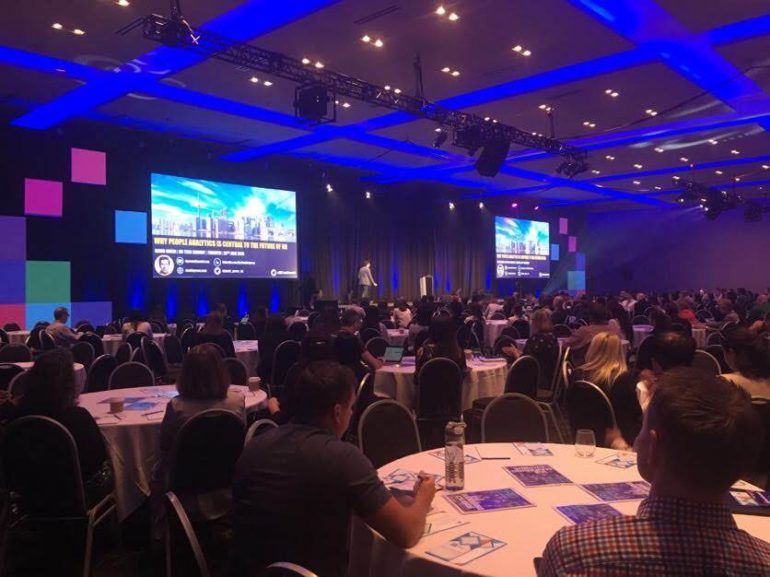Finding the right talent is one of the key factors in scaling a company, but the tools to do that aren’t always at the forefront of the conversation.
This week, the HR Tech Summit in Toronto brought together startups and HR professionals to explore the future of HR (hint: it’s being augmented by AI), and how startups can set the foundation for a strong HR process.
As the move-fast-and-break-things mentality of startups becomes trendy, many large enterprises are moving to open concept offices, buying ping pong tables, and working hard to send a message that they are open to innovation. But Anna Foat, director of global digital transformation at Sun Life, argued that isn’t enough.
“When it comes to execution, we need to let teams do the work in a way that they think is best.”
“You can see that in companies that spend a huge amount of money on office furniture, instead of software tools that developers actually use,” said Foat. “It’s amazing because people say, ‘look how beautiful it is,’ and you see very angry, frustrated, smart developers who sit at their very fancy desks.”
Corporates that don’t have the same urgency of startups that often struggle to find alignment between the teams on the ground and the leaders making decisions, but Foat advised larger companies to talk to the people doing the work to make sure that the tools they invest in actually have an impact.
.@GetVacationFund is the winner of the #HRTechSummit Tech Den! pic.twitter.com/0XjfYvLo4n
— Jessica Galang (@jessicagalangg) June 26, 2018
“I think the vision is really important and the strategy is really important, but when it comes to execution, we need to let teams do the work in a way that they think is best,” said Foat. “Give them the outcome, let them figure out the compass.”
As AI is on the path to automate administrative tasks in many industries, HR is no exception. Instead of going through resumes all day and ensuring everyone gts paid, professionals can do more to support a positive company culture.
“It will allow us to focus more on the human side and see the human connections,” said Indeed Global SVP of HR Paul Wolfe. “It’s important to focus on that relationship and the human side of both the candidate experience and the employee experience.”
“The real value HR can provide is as the architect of the ultimate talent experience from candidate to employee.”
A major point of emphasis for the conference was how the HR role would shift to one focused on improving both the candidate and employee experience. Daneal Charney, director of talent for MaRS Venture Services, said that Chatbots and AR technologies will be able to answer employee questions and perform candidate screening, meaning HR professionals will turn to developing the company brand and diversifying employee pipelines.
“The real value HR can provide is as the architect of the ultimate talent experience from candidate to employee, leveraging predictive data insights to inform how we improve things,” said Charney.
In her role, Charney has helped over 400 companies scale their teams across industries like healthtech, FinTech, and cleantech. The common mistakes she’s seen in her career include an overemphasis on hiring rather than retention; through this lens of thinking, founders invest in recruiters to find talent, only to omit the HR professional that builds the structure for keeping them at the company. Founders also often use the “50-person rule” to know when to hire HR, when at that point, they’re already facing diversity debt and compensation inequities.
Let the #Bots handle the manual stuff. Let us focus on the strategic, said @StacyZapar. Credit: @plum_io ⚡ #HRTechSummit pic.twitter.com/NEvqtiFfx0
— HRTechSummit (@HRTechSummit) 27 юни 2018 г.
To maintain core values during a period of rapid growth, Charney advised startups to “have rituals” (i.e. all-hands meetings that recognize people living out the company’s core values), and actually defining your core values.
“It’s got to be weaved into your values that you hire for and the values that you reward for,” said Charney. “To answer those questions, you need to hire an HR person really early on. An HR person is often the person telling the founder what others won’t tell them, [like] ‘we’re hiring the same person again and again’. That person will help the founding team mitigate risks and help them define what the culture is and build that into everything you do.”
The event also took the opportunity to recognize the startups paving the way for HR Tech. Eight Canadian startups pitched in the conference’s Tech Den for the chance to win a marketing campaign worth $20,000 from HRD Magazine and HRM Online. The final list of startups included Alex Desjardins, co-founder of BubbleHR; Ameer Asghar, CEO of Werk Technologies; Erica Pearson, CEO of Vacation Fund; Imran Mouna, co-founder of InStage; Stefan Kollenberg, CMO of Crescendo; Jonathan Garbe, CEO of Fintros; and John Tukums, CEO of DeepSubconscious.ai.
In the end, Vacation Fund—which offers employer-matched travel savings—took the top prize.
BetaKit is an HR Tech Summit media partner.


